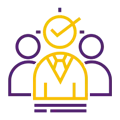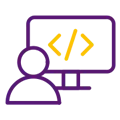How to Score Your Dream Job in the Gaming Industry - A Nerd's Guide

Table of contents
Are you an experienced gamer who's always wondered about working in a field you truly love? Whether you aim to escalate your career in game development or are coming from a different industry, understanding the key professions in the gaming sector and the required skills is paramount. This will enable you to tailor your studies and/or professional expertise accordingly.
The end result? A significantly higher chance of landing your dream job. Ready to embark on this exciting journey? Let's dive in!
Game Developer: Crafting Virtual Worlds
If you have a knack for coding coupled with a creative mind, game development might just be your calling. As a game developer, your role is to breathe life into virtual worlds, creating compelling gameplay experiences. Whether your specialization lies in programming, level design, or game mechanics, a strong foundation in programming languages such as C++, C#, or Java is essential. Enhance your skills by building a diverse portfolio of projects and collaborate with fellow enthusiasts to broaden your expertise.
Game Designer: The Architect of Fun
If you're the brains behind engaging game concepts and enthralling storytelling, game design could be the path for you. Game designers shape the core gameplay mechanics, level layouts, and overall user experience. Essential skills include robust problem-solving, a deep understanding of player psychology, and creativity. Showcase your ability to create engaging narratives, innovative mechanics, and immersive gameplay to distinguish yourself. Remain updated with industry trends and experiment with game design tools to hone your skills.
Game Artist: Painting Pixels and Bringing Characters to Life
For those with an artistic streak, a career as a game artist could allow you to animate digital worlds. From character design to environmental art and visual effects, game artists create stunning visuals that captivate players. Develop a diverse portfolio that displays your expertise in 2D or 3D art, animation, and concept design. Stay current with the latest tools and techniques, and collaborate with other artists to expand your skills and creativity.
Game Tester: A Simple Way To Kick off Your Gaming Career Without Prior Experience
If you are meticulous, detail-oriented, and dedicated to ensuring a flawless gaming experience, game testing might be the perfect gateway into the gaming industry, usually not requiring any prior professional experience. As a game tester, you'll identify bugs, provide feedback, and contribute to the overall quality of the game. Essential traits include strong analytical skills, attention to detail, and a genuine love for games. Demonstrate your ability to spot bugs and communicate effectively with developers to enhance the game's performance.
Game Producer: The Jack Of All Trades
As a game producer, you are responsible for ensuring smooth operations. You are the wizard behind the scenes, orchestrating the entire game development process. Responsibilities range from managing budgets and timelines to coordinating teams and overseeing quality control. Game producers are ultimate multitaskers who bridge the gap between creativity and business, ensuring the game meets its objectives and exceeds players' expectations. If you are organized, an excellent communicator, and thrive in a dynamic environment, this behind-the-scenes role might be your key to making magic happen.
Marketing, Sales & HR
If none of the above roles pique your interest, fret not. Every gaming company, though specific in its structure and roles, can also be viewed as a traditional business organization. Apart from some unique cases, the ultimate goal is to sell the games. Without adequate funds, the show can't go on, and funds usually don't come without proper marketing and sales activities. The same principle applies to HR, as, at the end of the day, a gaming organization is made up of people. HR professionals are vital to maximizing the potential of the organization's human capital. If you're working in a different industry and contemplating a switch to gaming, highlighting your passion for games and your transferable skills could indeed pave the way.
Beyond Game Development: Esports and Social Media
While we have primarily focused on the most sought-after roles in game development, the professional gaming world offers many more opportunities, with Esports and social media being prominent parts of the industry. These subjects are quite extensive and typically follow distinct rules, so we won't delve too deeply here. In general, though, you can definitely pursue a successful career in partnership management, event organization, media presence, and, of course, as a professional player. Streaming and video creation also present lucrative opportunities, though the competition is intense.
In conclusion, the gaming industry abounds with professional opportunities and is one of the fastest-growing sectors worldwide. To succeed, understanding the most sought-after skills and roles in the market is vital, and you should steer your studies and learning experiences towards them. I recommend a steady and consistent learning approach to enhance your appeal in the eyes of hiring managers. Finally, showcasing your passion and experience with video games will always be greatly valued.
Author of the article: Mirko Minenza
















